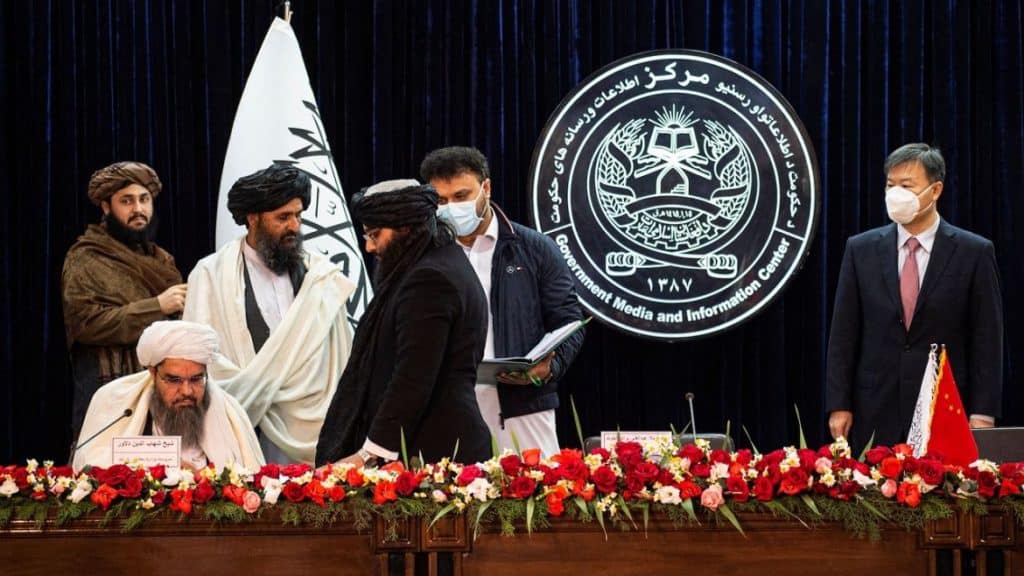By Anton Evstratov
Although there is very little prospect for international recognition of the Taliban government in Afghanistan, it actually already acts as a member of the international community and international political and economic process.

Official recognition of the regime is impossible for a number of reasons, including the Taliban’s presence on the lists of terrorist organizations of major world and regional powers, the rigid and unchallenged Islamist order in Afghanistan, and occasional high-profile reports of human rights violations.
The most notorious of these violations is the Taliban’s ban on girls and young women attending schools and institutions of higher education. The responsibility for enforcing this rule is reportedly placed on the administrations of these institutions.
At the same time, the current situation is soberly assessed by the Taliban and seems to fit all parts of the emerging interaction in Afghanistan. As before, Afghanistan is a knot of contradictions, but given the more moderate and thoughtful policies of the country’s modern leadership, labeled, unlike the first Taliban government (1996-2001), Taliban 2.0, the actors are trying to achieve more. In Afghanistan at the moment, the interests of Russia and Western countries, China and India, India and Pakistan, the West and Iran, as well as, on a number of issues, Central Asian states, clash.
In particular, Russia, not recognizing the Taliban government, unlike others, raised the question of the conditions of such recognition. A year earlier, at a conference on Afghanistan in Moscow, that condition was respect for human rights by the country’s new government. And despite the lack of progress on this issue, Russia’s loyalty to the Afghan government, while not recognizing it, is evident.
Moscow points out that the Taliban is now more of a national liberation movement than an Islamist movement, which means it is unlikely to export radical Islam. Moreover, it is the Taliban that balances and represses truly transnational, Islamist groups that aspire to world domination, such as the Islamic State (its Vilayat Khorasan branch operates in Afghanistan) and al-Qaeda (and its local branch, al-Qaeda in the Indian subcontinent). Moreover, in the current wave of dominant anti-Western politics in Russian foreign policy, the fact that the Taliban is confronting the United States and its allies plays into the improvement of relations between Russia and the movement.
This policy is very different from that of the Kremlin in the 1990s, when Moscow was a partner of the United States and helped the now politically and militarily non-aligned Northern Alliance, along with them, India and the Central Asian republics.
It is also worth noting Russia’s interest in Afghanistan as part of the TAPI pipeline, which will enable it to supply gas to a major consumer like India and connect gas flows from other Central Asian countries. This is especially relevant now against the backdrop of Russia’s confrontation with the United States and the West and Moscow’s attempts to build an alternative Eurasian hub. Stability and order in Afghanistan-secular or Islamist-is a necessary condition for success, and Russia is ready to cooperate with the Taliban government in this context.
The West, in turn, is extremely concerned about the growth of Russian influence in Afghanistan. This is expressed both in the accusations of “cooperation with terrorists” heard from time to time and in the recent feverish attempts to “return to Afghanistan.”
At this point, it is obvious that the Taliban are in the country for good. Therefore, the U.S. and its allies have relied on interaction with Ghani’s fallen government and Ahmad Masoud’s defeated Afghan National Resistance Front.
This explains former German Ambassador to Afghanistan and current UN Special Representative for Afghanistan Markus Potzel’s call for his country and other Western countries to reopen embassies in Kabul. The diplomat made no secret that the main motivation should be to secure the interests of these countries in Afghanistan. Of course, this does not imply recognition of the Taliban government, and it is primarily intended to balance Russian influence.
Also worth noting is information about U.S. attempts to establish contacts with the Islamic State and some other groups opposing the Taliban movement in the territory of Afghanistan. This kind of information was given by Zamir Kabulov, a representative of the Russian Foreign Ministry, and of course is not confirmed by the U.S., but taking into account their experience in assisting the armed Islamist opposition (including IS) in Syria and other Middle Eastern countries, it should be taken quite seriously.
As for the Russian accusations, the most noteworthy is the attempt to expose Moscow’s export of weapons from Afghanistan for use in Ukraine. These are U.S. weapons that were allegedly previously used by both the U.S. and Ghani armies and abandoned in 2021. However, on Jan. 27, U.S. Security Council Coordinator for Strategic Communications John Kirby could not confirm these suspicions during a conversation with reporters.
China, for its part, is increasing its economic penetration in Afghanistan. It was China, through the oil and gas company CAPIEC, that was the first country to enter into a formal investment agreement with the unrecognized Taliban regime-a contract for oil production in the Amu Darya oil and gas basin.
The agreement appears mutually beneficial, as oil extracted with Chinese technology will be processed in Afghanistan and the Afghan government’s share in the project, currently 20 percent, has the prospect of rising to 75 percent. In addition, the contract and especially its implementation will be a positive example of investment in Afghanistan for other countries around the world.
It should be noted that China has been building oil production infrastructure in Afghanistan since 2012. China’s interest in Afghan territory is reinforced by the availability of lithium and rare earth metals worth a total of $1 trillion, which are extremely important for the Middle Kingdom’s large and fast-growing economy.
Kabul is still interested in joining China’s Belt and Road initiative, and Beijing, in turn, like the Russian Federation, requires security and stability on Afghan soil for this-no matter which government and authority.
India, which opposes China in the region, was the largest investor in Afghanistan before the second coming of the Taliban (having invested $3 billion in various projects on the country’s territory) and was in political prostration for some time after August 2021. However, this was followed by an invitation from the Taliban to bring back Indian companies that had left Afghanistan, promising them security, and renewed activity by Indian diplomacy on the Afghan issue.
The latter is due both to a desire to prevent free operation in the Islamic Emirate by Pakistan and its supporting China and to a desire to stop the spread of the terrorist threat. However, for New Delhi, in some cases these vectors may converge.
For example, Pakistan controls a strong Afghan Taliban group, the Haqqani Network, which prevents a movement generally loyal to India from establishing even closer contact with it and even recruits fighters in Afghanistan for the Islamist resistance in Kashmir. The Indian embassy in Kabul and the Afghan Sikh and Hindu communities are believed to have been attacked at the instigation of Islamabad. On the other hand, New Delhi itself exerts influence over the Tehrik-e Taliban Pakistan network, operating in Pakistan and supported by the Afghan Taliban, which has been openly fighting with the Pakistani army since 2014 and has played a key role in the border dispute between Afghanistan and Pakistan over the Durand Line (the border between Afghanistan and Pakistan drawn by the British colonial administration after two Anglo-Afghan wars. The border is barely marked and poorly controlled due to geography and ethnopolitical realities).
The actions of Pakistani troops against the Tehrik-e Taliban last year-already on Afghan soil, resulting in dozens of civilian casualties-do not increase the country’s sympathy for Islamabad and its policies, even though the Taliban originated in Pakistan and with the direct involvement of Pakistani military and intelligence services. New Delhi, on the other hand, is growing in popularity in the country. It is believed that at least 69 percent of Afghans currently have a positive attitude toward India and interaction with it.
As for Iran, the country, on the one hand, is also interested in economic projects in Afghanistan and, on the other, is home to the largest number of Afghan refugees (the total number of refugees is about 3.5 million, with at least one million arriving in 2022. Half of them, however, had to be sent back. Tens of thousands more have continued their journey to Turkey and EU countries), encountering integration difficulties. Most of the Shiite Hazaras, who fear persecution by the Sunni Taliban, are traveling to Iran, although they are not the only ones.
Economically, Afghanistan has a contract with Iran to supply Iranian oil. In addition, Tehran is interested in the iron ore deposit on the Sangan border. In the Afghan issue, the Islamic Republic’s interests do not conflict with any of the regional and world powers except the United States, and the latter’s departure from the country has opened serious prospects for Tehran.
As for the Central Asian states bordering Uzbekistan, Turkmenistan, and Tajikistan, on the one hand the Taliban, unlike in the 1990s, show no claim to their territories, on the other hand they demonstrate a differentiated approach to them.
Thus, with Uzbekistan the project of building the Trans-Afghan Highway, which will bring Uzbek goods to Pakistan and India, is on the horizon, and Kabul has refused to support the Uzbek opposition, Turkmenistan is interested in the construction of the aforementioned TAPI, and Tajikistan is perceived if not as an adversary, as an antagonist of the Taliban regime. For this reason, the latter has entrusted the protection of the Afghan-Tajik border to the currently affiliated group Jamaatu Ansarullah, which is considered a terrorist group in Dushanbe.
The outlook for Afghanistan-Kazakhstan relations appears neutral. On the one hand, the states have no fundamental political or ideological claims toward each other. On the other hand, in the region’s triangle of interests consisting of Russia, China, and India, Kazakhstan is guaranteed to play a key transit role, and, as with the aforementioned powers, stability and security on Afghan territory-with or without the Taliban-are of paramount importance.
Both the recognition and the building of all these vectors of relations with Afghanistan are hampered by the fact that the Taliban, despite their victory in the confrontation with the Americans and the Ghani government, have not yet succeeded in fully ensuring security throughout the country. Therefore, the aforementioned branches of IS and al-Qaeda not only control Afghan regions and commit terrorist acts within Afghanistan’s borders, but also spread their activities outside its borders. For example, there was a terrorist attack on the Russian embassy in Kabul, which resulted in several casualties, and local al-Qaeda leaders had to be liquidated by the Indian army in Kashmir. The influx of refugees to Iran and the concentration of disputed fighters on the border with Tajikistan also do not add to the credibility of the Taliban government.
Author: Anton Evstratov (Russian historian, journalist and journalist living in Armenia, lecturer at the Department of General History and Foreign Regional Studies at the Russian-Armenian University in Yerevan).
(The opinions expressed in this article are solely those of the author and do not necessarily reflect the views of World Geostrategic Insights)
Image Source: Ahmad Sahel Arman/AFP (Acting minister of mines and petroleum Shahabuddin Dilawar and Afghanistan’s acting first deputy prime minister Abdul Ghani Baradar and China’s ambassador to Afghanistan Wang Yu announce an oil extraction deal in Kabul on January 5, 2023).







